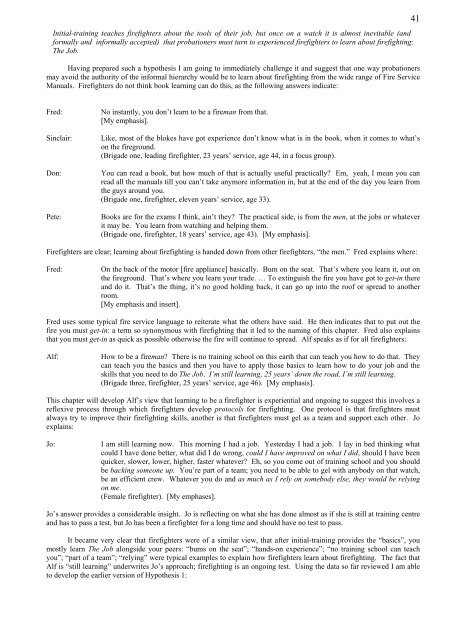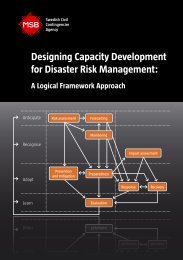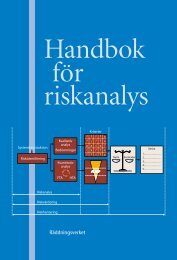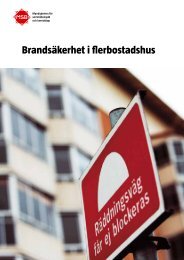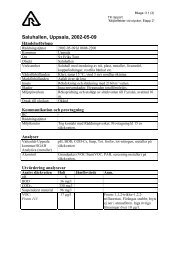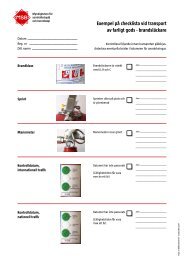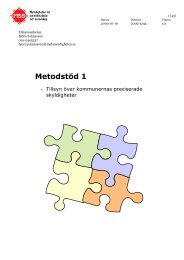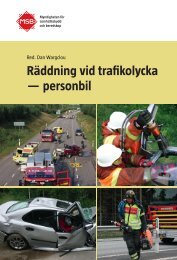One more last working class hero
One more last working class hero
One more last working class hero
Create successful ePaper yourself
Turn your PDF publications into a flip-book with our unique Google optimized e-Paper software.
Initial-training teaches firefighters about the tools of their job, but once on a watch it is almost inevitable (and<br />
formally and informally accepted) that probationers must turn to experienced firefighters to learn about firefighting:<br />
The Job.<br />
Having prepared such a hypothesis I am going to immediately challenge it and suggest that one way probationers<br />
may avoid the authority of the informal hierarchy would be to learn about firefighting from the wide range of Fire Service<br />
Manuals. Firefighters do not think book learning can do this, as the following answers indicate:<br />
41<br />
Fred:<br />
Sinclair:<br />
Don:<br />
Pete:<br />
No instantly, you don’t learn to be a fireman from that.<br />
[My emphasis].<br />
Like, most of the blokes have got experience don’t know what is in the book, when it comes to what’s<br />
on the fireground.<br />
(Brigade one, leading firefighter, 23 years’ service, age 44, in a focus group).<br />
You can read a book, but how much of that is actually useful practically? Em, yeah, I mean you can<br />
read all the manuals till you can’t take any<strong>more</strong> information in, but at the end of the day you learn from<br />
the guys around you.<br />
(Brigade one, firefighter, eleven years’ service, age 33).<br />
Books are for the exams I think, ain’t they? The practical side, is from the men, at the jobs or whatever<br />
it may be. You learn from watching and helping them.<br />
(Brigade one, firefighter, 18 years’ service, age 43). [My emphasis].<br />
Firefighters are clear; learning about firefighting is handed down from other firefighters, “the men.” Fred explains where:<br />
Fred:<br />
On the back of the motor [fire appliance] basically. Bum on the seat. That’s where you learn it, out on<br />
the fireground. That’s where you learn your trade. … To extinguish the fire you have got to get-in there<br />
and do it. That’s the thing, it’s no good holding back, it can go up into the roof or spread to another<br />
room.<br />
[My emphasis and insert].<br />
Fred uses some typical fire service language to reiterate what the others have said. He then indicates that to put out the<br />
fire you must get-in: a term so synonymous with firefighting that it led to the naming of this chapter. Fred also explains<br />
that you must get-in as quick as possible otherwise the fire will continue to spread. Alf speaks as if for all firefighters:<br />
Alf:<br />
How to be a fireman? There is no training school on this earth that can teach you how to do that. They<br />
can teach you the basics and then you have to apply those basics to learn how to do your job and the<br />
skills that you need to do The Job. I’m still learning, 25 years’ down the road, I’m still learning.<br />
(Brigade three, firefighter, 25 years’ service, age 46). [My emphasis].<br />
This chapter will develop Alf’s view that learning to be a firefighter is experiential and ongoing to suggest this involves a<br />
reflexive process through which firefighters develop protocols for firefighting. <strong>One</strong> protocol is that firefighters must<br />
always try to improve their firefighting skills, another is that firefighters must gel as a team and support each other. Jo<br />
explains:<br />
Jo:<br />
I am still learning now. This morning I had a job. Yesterday I had a job. I lay in bed thinking what<br />
could I have done better, what did I do wrong, could I have improved on what I did, should I have been<br />
quicker, slower, lower, higher, faster whatever? Eh, so you come out of training school and you should<br />
be backing someone up. You’re part of a team; you need to be able to gel with anybody on that watch,<br />
be an efficient crew. Whatever you do and as much as I rely on somebody else, they would be relying<br />
on me.<br />
(Female firefighter). [My emphases].<br />
Jo’s answer provides a considerable insight. Jo is reflecting on what she has done almost as if she is still at training centre<br />
and has to pass a test, but Jo has been a firefighter for a long time and should have no test to pass.<br />
It became very clear that firefighters were of a similar view, that after initial-training provides the “basics”, you<br />
mostly learn The Job alongside your peers: “bums on the seat”; “hands-on experience”; “no training school can teach<br />
you”; “part of a team”; “relying” were typical examples to explain how firefighters learn about firefighting. The fact that<br />
Alf is “still learning” underwrites Jo’s approach; firefighting is an ongoing test. Using the data so far reviewed I am able<br />
to develop the earlier version of Hypothesis 1:


